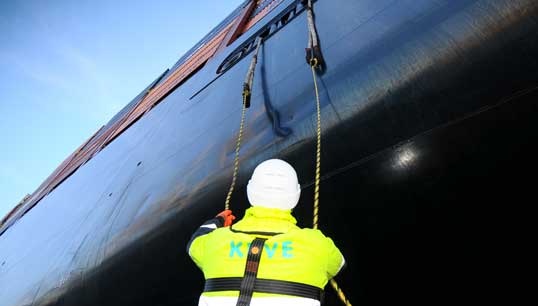Efforts to limit the effects of Omicron Covid variant on seafarers must be scaled up, UN agencies say
4 March 2022

Four United Nations agencies have urged improved access for seafarers to vaccines, Covid tests, health documents and personal protective equipment (PPE) in the wake of the Omicron Covid variant.
The world's 1.9 million seafarers have played a vital role in keeping the world's shipping and trade moving, and they say efforts to limit its effects on seafarers must be scaled up.
The International Labour Organization (ILO), the International Maritime Organization (IMO), the United Nations Conference on Trade and Development (UNCTAD), and the World Health Organization (WHO) reiterated their calls to governments, national and local authorities, and other relevant stakeholders to limit the effects of the Covid-19 Omicron variant on crew changes while safeguarding the health and wellbeing of seafarers and avoiding supply chain disruptions.
In a joint statement the UN agencies list 10 critical actions to address evolving challenges to international shipping and its key workers. These will minimize the adverse impact on seafarers and their families of Covid-19 , including its latest variants and actions taken by authorities to contain it. They will also help to protect global trade and sustainable development while continuing to protect local communities.
While the number of seafarers that remain stranded has decreased it remains considerable. Further efforts must be made to rectify the situation and alleviate the continuing crisis. Moreover, the full impact of the Omicron variant and related response measures on crew changes is not yet clear and further 'variants of concern' (VOCs) may yet emerge, the agencies say.
As a result of some of the measures put in place to mitigate the spread of the virus many seafarers are still unable to leave their ships, remaining stranded at sea far beyond the expiration dates of their contracts and the default 11-month maximum period of continuous service on board that is in keeping with the provisions of the Maritime Labour Convention, 2006, as amended (MLC, 2006) .
10 critical actions
The critical actions needed for Merchant Navy seafarers are:
- Provide seafarers with immediate access to medical care as well as facilitate their medical evacuation when the required medical care cannot be provided on board.
- Designate seafarers as 'key workers', providing an essential service, to facilitate maritime crew changes and safe movement across borders, and recognize relevant documentation for this purpose.
- Prioritize the vaccination of seafarers, as far as practicable, in national Covid-19 vaccination programmes and exempt them from any national policy requiring proof of Covid-19 vaccination as the only mandatory condition for entry, in accordance with WHO recommendations.
- Provide or administer Covid-19 tests and appropriate PPE to seafarers, including PCR tests where necessary, to facilitate the identification of cases on board or at the port, and to facilitate the movement of seafarers, including shore leave and crew changes.
- Ensure the consistent application of internationally agreed protocols and standards, including those for seafarers' travel and vaccination documents, coordinate appropriately, and take measures to avoid punitive measures, fines and excessive costs.
- Adopt the latest legal instruments, including the MLC, 2006 and the Seafarers' Identity Documents Convention (Revised), 2003, as amended (No. 185), and ensure their implementation.
- Implement the recently updated WHO sector-specific guidance for the management of Covid-19 on board cargo ships and fishing vessels, published in December 2021, which, among other issues, highlights the importance of nonmedical interventions, such as the use of face masks irrespective of vaccination status.
- Provide, where relevant, public key certificates associated with any health proof to relevant trust networks, such as ICAO for international travel.
- Continue to collaborate to ensure that relevant guidance is regularly updated, in line with developments and evolving scientific insights; and mechanisms are in place to reduce and effectively respond to medical emergencies at sea.
- Undertake concerted collaborative efforts to keep seafarers safe and limit disruption to supply chains, as well as prevent the unchecked spread of emerging VOCs, which could prolong the pandemic and its wide-ranging socioeconomic consequences.
Tags
More articles
Seafarers remain 'out of sight, out of mind' after pandemic, Nautilus survey shows
Nautilus International has released the findings of its new 'maritime barometer' survey, which raises serious concerns about the public's lack of knowledge about the UK’s essential maritime industry.
Maritime charities step up to support seafarers in Russia-Ukraine conflict
Maritime charities step up to support seafarers in Russia-Ukraine conflict
Royal thank you to seafarers for sustaining global trade in a crisis
HRH The Princess Royal recognised seafarers for their hard work and perseverance during the pandemic on a recent visit to The Mission to Seafarers in her capacity as the charity's president.
